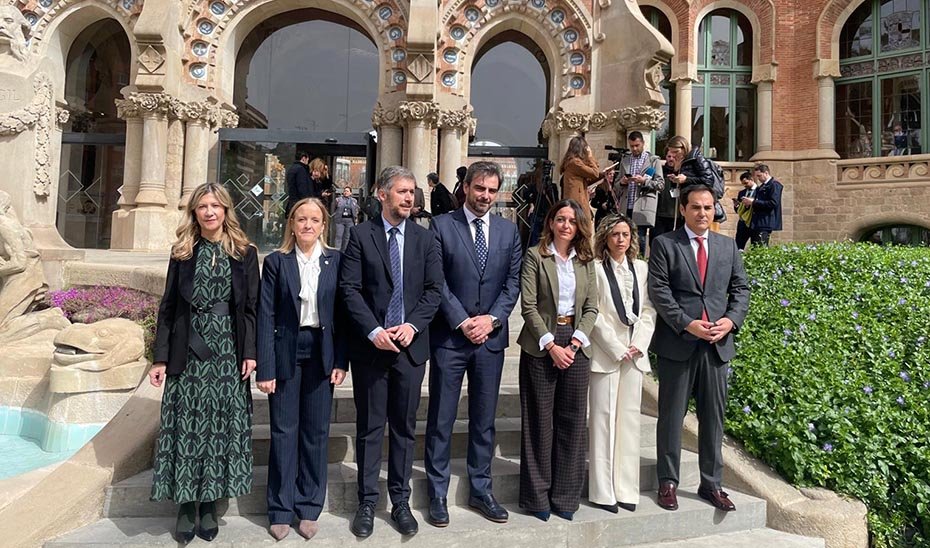The Minister of Justice, Local Administration, and Public Function, José Antonio Nieto, has expressed his regret that the Ministry of Justice refuses to address the funding of the Public Service Efficiency Law in the Sectorial Conference convened in Barcelona, as requested by several autonomous communities. «They say it has no cost and will generate savings,» Nieto stated, although the Junta estimates that just the first phase of the law, which in Andalusia requires the transformation of 70 out of the 85 judicial districts before July 1, will amount to 60 million euros for the new staff positions to be created, the rearrangement of staff to adapt to the instance courts, or the renovations in the courthouses to restructure the spaces.
Nieto has lamented that due to the lack of agreement to include, among other points to be voted on, the approval of funding for the law on the agenda, several regional councilors have refused to participate in the meeting and has urged the Government to reconsider. «They say it has no cost and will generate savings, if that’s the case, why is the Ministry reluctant to take it on and then won’t have any objections from the autonomous communities?» he emphasized.
In this regard, he criticized the mention of the allocation of 325 million to the communities when these funds, approved in 2021, came from the European Union and «were distributed to all ministries and obligatorily allocated to the autonomous communities.» Nieto pointed out that these funds are being used for Justice digitization projects unrelated to the Efficiency Law, such as the implementation of the Dicireg system in Civil Registries.
«We are risking the operation and quality of the public Justice service at a time when it is under pressure and in a critical situation», said Nieto, expressing his hope that «this very afternoon we could meet with minimal assurance and less mistrust than what we have perceived from the Ministry to work together, which is what we want, but in a relationship of equality and co-governance.»
The Andalusian Justice system has a volume almost equivalent to the communities without transferred competencies, the so-called Ministry territory. It has 85 judicial districts, 744 single-person bodies that will be grouped into instance courts, 700 peace courts that will be transformed into Municipal Justice Offices, almost 10,000 staff, 550 prosecutors, and about 700 LAJ.
The Efficiency Law requires adapting 70 out of the 85 judicial districts before July 1, three more by October 1, and the 12 with the most bodies (those of the eight capitals and major cities) by December 31. Additionally, on April 3, the obligation to attempt to resolve civil and commercial disputes before filing a lawsuit came into effect, which will require covering the expenses generated by these procedures for court-appointed lawyers. Andalusia is the only community that has been covering these costs since January 1, 2024, at 400 euros per case, but only when an agreement is reached, as mediation was voluntary until now. Now, given the mandatory mediation attempt, the Junta will also have to cover the costs if an agreement is not reached, when carried out by a duty lawyer.
A procedural requirement that Andalusians can process through the Information Points for Mediation in Andalusia (PIMA), established since 2021, while the implementation of the Public Civil and Commercial Mediation Service (SEMCA) is being finalized. Last year, the Penal Mediation Service (SEMPA) was launched to promote this alternative dispute resolution method.
Furthermore, the Junta has launched a Judicial Infrastructure Plan 2023-2030 that will mobilize 1.5 billion euros to upgrade 100% of the judicial districts’ facilities, with the construction of new buildings and the expansion or renovation of existing ones, adapting all to the space reorganization resulting from the Justice system transformation envisaged in the Efficiency Law.
Regarding the restructuring of staff in accordance with the new Official Judicial model, in the initial implementation phase of the law, 80 additional staff positions will be created, which, along with the salary supplements for new roles assuming new functions, entails an annual cost of 3.5 million.
All of this implies a budgetary effort that the Andalusian government under Juanma Moreno is assuming alone to implement the reform stipulated in the state law, published in January with the regional budgets already approved, within the tight deadlines set by the Ministry.

